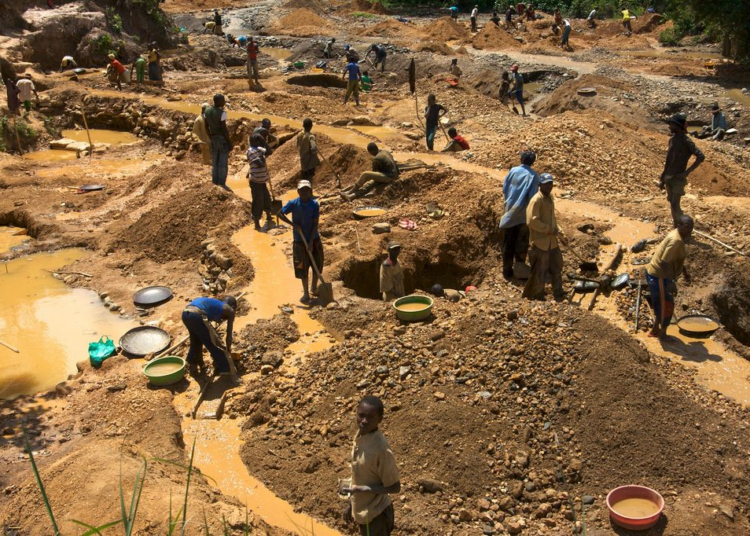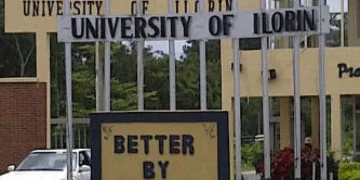Renewed efforts by the federal and state governments to enhance food security through various incentives to farmers are under threat by the mass exodus of villagers from faming to the more thriving illegal mining in some states of the federation.
The farmers who cited the current harsh economy, persistent bandit attacks, killing, kidnapping, and in some cases, raping of their wives and daughters, are not alone in the drift as their children have also abandoned their education to join them in the crave for quick money, which illegal mining offers.
A cross-section of the farmers in seven northern states interviewed by LEADERSHIP Weekend said it is safer for them to abandon their farms and concentrate on illegal mining since bandits do not regularly attack them at the mines.
They said apart from the harsh conditions their foreign patrons and some Nigerian businessmen make them to work, the mining sites are safer and offer quick returns than the farms as they are sometimes not allowed to harvest the produce by the rampaging bandits.
An investigation carried out by LEADERSHIP Weekend in Benue, Kwara, Niger, Plateau, Kebbi, Bauchi, and Zamfara states showed that farms in rural and security-exposed communities have been deserted for illegal mines spread across the affected states.
These states are known for mass production of yam, rice and other grains.
The worst-hit is Zamfara, where recent statistics released by the state government revealed that over 9,000 people were killed as a result of the protracted insecurity in the state.
Illegal mining of gold booms in Bukkuyum, Maru, Anka, Birnin Magaji, Maru, Kaura-Namoda, and Tsafe LGAs.
The illicit trade is carried out mostly by local artisans, traders from the neighbouring countries, Russia and China.
A resident of Bagega village who gave his name as Nasiru Bagega said most of their children had abandoned their school to join their parents in this “more lucrative business than farming,” adding that some of the illegal miners get up to N2 million in a few days.
A licensed miner, Abdulmalik Anka, said top politicians, notable businessmen and the elite, among others, were involved in illegal mining in the state.
Many of the locals are employed by these foreign nationals with small residences built in the forests where they supervise these illegalities.
Another resident, Musa Bagega, told our correspondent that “strangers have invaded our villages; they are all into mining. They are in our villages and the surrounding neighbourhoods. Some have even bought houses for their workers; we feel unsafe with their daily influx.”
In Niger State, illegal artisan mining is on the increase as many young people, both male and female, participate in the act.
Some of those interviewed said it offered them quick money, adding that they mostly engage in the mining of gold.
A 17-year-old who lives and shuttles between Titungo and Chanchaga areas where illegal mining thrives, Mohammed Usman, told LEADERSHIP Weekend that it pays them to mine gold rather than farm.
Reminded of the danger associated with it, he said, “We are aware. Last week, two people died in a neighbouring village after Paiko because the mining site submerged but the gain sometimes outweighs the danger.”
Another illegal artisanal miner, Salihu Ismail said, “I am not from here. I came from Kebbi State. We have middlemen who are not from here too; we sell to them.”
Most of the boys at the back of M.I. Wushishi, Minna, were not willing to talk as they operate amid frequent security raids.
It was gathered that despite the security raids, the youths are unperturbed as they work at the sites during hours they can evade police arrest.
Asked why illegal mining still thrives despite the state government’s effort, the commissioner for Mineral Resources, Garba Sabo, attributed it to lack of parental care, connivance of local communities and the willingness of land owners to rent their property for mining as well as banditry.
He said, “Sometimes, when you arrest the women, they will tell you they are widows; that their husbands were killed by bandits and needed to engage in mining to survive. And because some of the men could not access their farms, they also engaged in illegal mining.”
Sabo said Governor Umaru Bago was committed to ending the trend, stressing that the government had set up a taskforce hard to curb the situation.
In Kwara State, farmers in Bani, Kaiama LGA in Kwara North Senatorial District have also abandoned their farmlands for illegal mining.
It was gathered that some youths have also abandoned their education and joined their parents in the illicit trade.
The discovery of lithium ore in the agrarian community and the crave for quick money lured the farmers into abandoning their farms.
A source confided in LEADERSHIP Weekend that the violence associated with farming equally forced the residents of Bani and its environs to switch to illegal mining.
A farmer-turned illegal miner who pleaded anonymity said an artisanal miner earns as much as N50,000 daily from the trade. Also, a resident of Bani, Malam Yinusa, said mining is more lucrative than farming and confirmed the unwillingness of most residents of the community to return to their farms.
The state commissioner for Solid Minerals, Dr Afeez Abolore, said the incumbent administration was unrelenting in its efforts to halt illegal mining in the state.
He said the government was collaborating with security agencies to flush out illegal miners from the state.
In Bauchi State, a resident of Ningi who pleaded for anonymity, said one of the areas known for huge deposits of tin, cassiterite and monazite, raised concerns about the influx of illegal miners from different parts of the country and beyond.
He said, “You could see people from Sokoto, Kebbi and even the Niger Republic at Dabar-Lantana, a mining site in Ningi.
“In most of the areas where miners operate, you see people from different tribes, not only Fulani herdsmen,” he said.
Also, a women’s group in Gada-Biyu, a community in Bauchi LGA, raised concerns over the activities of miners on their children and the environmental sustainability in the area.
The leader of the group, Matthias Ugonma, lamented the devastating impact that mining had on women and children in the Gada Biyu community.
The group demanded immediate action on mining hazards and an end to the exploitation of vulnerable groups in the Gada Biyu community.
Meanwhile, the Bauchi State Chambers of Commerce Mines and Agriculture (BACCIMA), has engaged traditional rulers and security groups to curb illegal mining on allocated fields in the state.
The director-general of BACCIMA, Sani Tahir, said the relevant authorities allocated virtually all identified mining fields in Bauchi to licensed mining firms.
The situation is different in Kebbi State as the ban on illegal mining by Governor Umar Idris is producing results.
Some of the miners said since the ban was imposed by the state government, they had returned to their farms.
One of them, Yakubu Warrah, said before the ban, he got a lot of money from mining, but at the risk of his life.
Another miner, Danladi Garin Auwal, said before the ban, he was making about N50,000 daily and had to pay charges to those in control of the sites.
The commissioner for Solid Minerals Development, Haliru Aliyu Wasagu, said Kebbi was free of Illegal mining.
In Benue State, most miners use children not necessarily from Internally Displaced Persons (IDPs) camps but those in communities who are paid peanuts to do the hard jobs.
During a visit to one of the IDP camps, the camp manager, Emmanuella Chagu, said the number of young persons in the camp has drastically reduced because most of them have travelled to the South-South and South West to engage in cocoa farming to fend for themselves and their families.
Plateau State was the home of mining activities by the Europeans before the discovery of oil in Nigeria.
Investigation revealed that by 1913, there were 108 mining companies registered by the Royal Niger Company and in 1943, tin mining on the Plateau was at its peak as there were about 80,000 African workers.
The new trend in the state is that children of primary and secondary school age have abandoned their education for illegal mining.
These illegal mining activities are being carried out by mostly youths in Jos North, Bassa, Jos South, Riyom and Barkin Ladi local government areas.
Investigation by our correspondent revealed that close to a thousand youths including married women could be seen on a single mining site.
Not long ago, stakeholders in the education sector in Barkin-Ladi Jos North/ Jos South and Bassa local government area called on the relevant authorities to look into the ugly trend that is affecting the education of school age children.
One of the head teachers, Mrs.Sarah Williams said, “This development has led to an increase in school-dropouts in the area.”
Similarly, the principal of Government Secondary School, Kabong, James Pam, told our correspondent that the ongoing mining activities in the area are threatening education in the area.
He also pointed out that last year it took the effort of security personnel to chase away these illegal miners in the area but this year they have come back again in large numbers.
Also, a Primary school teacher in Vom community of Jos South local government, who spoke on condition of anonymity, said most of the pupils, like their parents, have been exposed to ways of making money through mining at the expense of their education.
Similarly, a community leader in Heipang, Barkin Ladi local government area, who did not want his name mentioned said the ugly situation is posing serious danger to the growth and development of the Berom land.
According to him, despite the efforts of some community leaders and the state government to sensitise the young ones, most parents encourage their children to drop out of school and go into mining because of the pecuniary benefits.
He argued that federal and state government agencies should, as a matter of urgency, wake up from slumber to do everything possible to stop the illegal mining activities in the state.
Also speaking with LEADERSHIP Weekend at one of the sites of illegal mining at Bukuru low-cost junction, a 22-year-old, Pam Dalyop said he uses the proceeds from the business to take care of himself and his aged parents.





